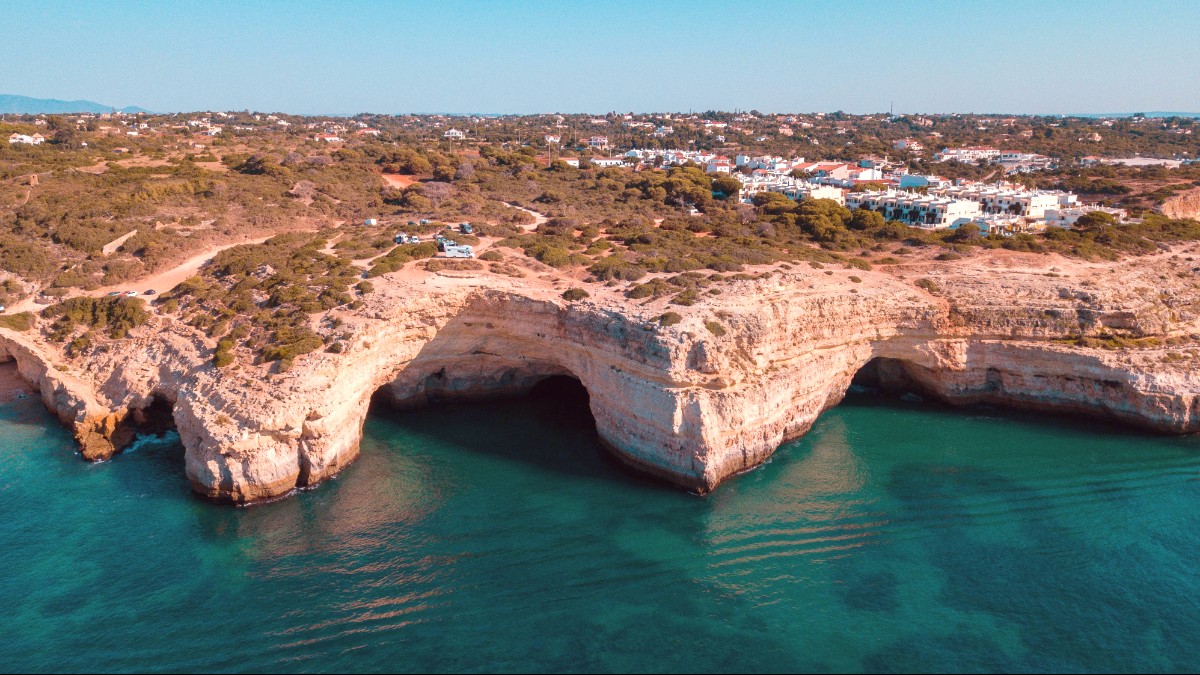
Portugal
Algarve cuisine its roots in the Atlantic coast, seafood a cornerstone of almost every menu. The region's long Moorish occupation (8th to 13th centuries) a lasting influence, evident in the use of specific spices like cumin and saffron, and ingredients like almonds, figs, and citrus fruits.
The Mediterranean diet is common, emphasizing fresh, locally sourced ingredients, ample olive oil, abundant vegetables, and, of course, fish. This historical blend an unique and delicious culinary identity.
A distinctive dish, the cataplana is a traditional copper clam-shaped pot. Used to steam flavorful stews. Frequently combine various types of seafood, or sometimes meat, with vegetables, herbs, and wine.
This spicy grilled chicken dish originated in Guia, a village very close to Albufeira. It has become a regional specialty, famous for its fiery marinade. Many specialized restaurants, known as "churrasqueiras," serve it.
Desserts often feature almonds, figs, and carob, reflecting the region's agricultural output. These traditional sweets are a must-try.
A rich seafood stew, cooked and served in a distinctive copper, clam-shaped pot. Typically features a mix of various fresh fish and shellfish (clams, prawns, mussels), simmered with onions, peppers, tomatoes, and herbs.
Widely available in seafood restaurants throughout Albufeira.
Grilled chicken marinated in a spicy piri-piri (chili) sauce. This dish originated in Guia, a village a short drive from Albufeira. A regional specialty, famous for its fiery marinade.
Look for a "churrasqueira" for an authentic experience.
Especially popular in summer, specifically from June to August. Fresh sardines grilled whole over charcoal, often served simply with boiled potatoes and a fresh salad.
Find them at beachfront restaurants (restaurantes de praia) and traditional tascas.
Vinho Verde (young, effervescent white wine), Ginja (sweet cherry liqueur), Medronho (strong arbutus berry brandy), Sagres/Super Bock (Portuguese beers), Sumol/Compal (fruit juices/sodas), Água de Pedras (naturally sparkling mineral water).
Pastel de Nata (custard tart), Dom Rodrigos (egg threads, almonds, sugar), Fig and Almond cakes (utilizing regional produce). These are rich and satisfying.
Albufeira's dining scene a wide array of choices, from sophisticated fine dining to casual street food, reflecting its diverse tourist base.
Several upscale restaurants in and around Albufeira a sophisticated culinary experience. These establishments often feature modern Portuguese cuisine or international dishes, many boasting panoramic sea views.
These are abundant throughout Albufeira, notably in the Old Town, Oura, and The Strip. They a wide variety of cuisines, including traditional Portuguese, Italian pizzerias, Indian, Chinese, and British fare.
These options provide authentic Portuguese food at affordable prices.
Due to its popularity as a tourist destination, Albufeira a wide selection of international restaurants. Easily find Italian pizzerias, various Indian restaurants, Chinese buffets, and numerous British pubs serving familiar comfort food. Options for every taste.
Variety for all palates.
Consider Italian pizzerias, Indian restaurants, Chinese buffets, and British pubs throughout the town. These choices ensure familiar options for international visitors.
Familiar dining experiences.
Authentic experience, good value, quick meals.
General dining, variety of tastes, family meals.
Special occasions, culinary experiences.
Sea views, convenient for beach days, relaxed ambiance.
Basic Portuguese phrases for dietary restrictions: "Eu sou vegetariano/vegan" (I am vegetarian/vegan), "sem glúten" (without gluten), "sem lactose" (without lactose).
Useful for dining out.
Supermarkets often stock a range of gluten-free products in a dedicated section. Check labels carefully for other allergens.
Self-catering for dietary control.
The local municipal market (Mercado Municipal dos Caliços) fresh produce, fish, and meat.
Focus on vegetarian or fish options in traditional places where dedicated Halal or Kosher restaurants are not common.
Beyond simply dining out, Albufeira ways to connect with the local food culture.
Several companies in Albufeira and the wider Algarve region classes focusing on Portuguese or Algarve cuisine.
Food tours an organized way to explore traditional eateries and taste local specialties, often with a knowledgeable guide.
You can visit vineyards in the nearby Guia region, known for its wines. Opportunities also exist to visit olive groves or farms specializing in figs and almonds in the wider Algarve region.
Local food festivals, often celebrating specific produce like sardines, seafood, or traditional sweets, happen throughout the year, especially in summer.
Dining in cliffside restaurants with panoramic sea views a memorable experience. Many establishments take advantage of Albufeira's coastal location for stunning backdrops, especially at sunset.
Experience Portugal's soulful, traditional music in specific restaurants or dedicated Fado houses. These evenings typically feature live performances by Fado singers and guitarists. Check local listings for authentic Fado nights.
Some hotels or larger restaurants may host evenings traditional Portuguese folk dancing and music, a lively display of regional customs.
While less developed in Albufeira's core, some rural tourism initiatives exist inland. These provide visitors with a understanding of traditional village life and local customs, often involving interaction with residents and local activities.
Hands-on preparation of traditional dishes, often starting with a market visit.
Learning about traditional ceramic techniques, more common in nearby villages like Porches.
Short-term Portuguese language courses or private tutors available for a cultural dive.
An essential part of cooking classes, selecting fresh ingredients and observing local life.
The world-famous Portuguese custard tart. Enjoy it warm, often dusted with cinnamon. Available in every pastelaria and cafe.
Traditional Algarve sweets made with delicate egg threads, ground almonds, and sugar, often presented in intricate shapes. Many local variations exist for fig and almond cakes.
"Green wine," an unique, young, often slightly effervescent, crisp white wine from northern Portugal. It is refreshing, especially in warm weather.
Ginja is a sweet cherry liqueur, typically served in a small shot glass, often with or in a chocolate cup. Medronho is a strong, traditional fruit brandy from the arbutus berry, local to the Algarve hills. A distinct, potent flavor.
Sagres/Super Bock are the two most popular Portuguese beer brands. Sumol/Compal are popular brands of Portuguese fruit juices and sodas. Água de Pedras is a popular naturally sparkling mineral water.